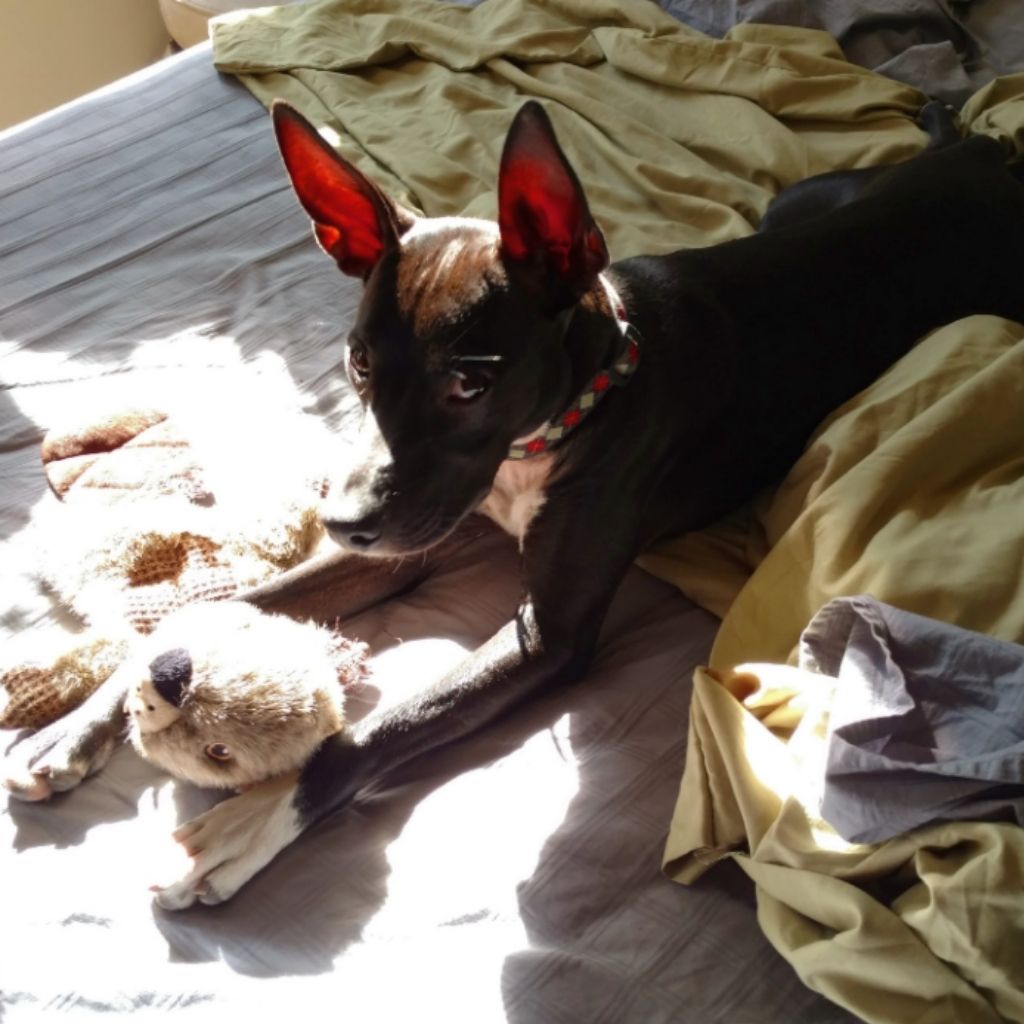stress & anxiety support

free shipping over $100 (USA & Canada)
1-877-937-4372 the pet expert hotline


Everyone loves baby animals. Who can resist those big floppy feet and droopy, longing eyes? I have a lot of experience with puppies and kittens because I have had so many pets.
I remember the first time I saw my little Billy. He was a puppy abandoned on a highway in Brazil. I was headed to work, and I saw this little brown boy. All by himself. In peril on the highway. There were no second thoughts. I had to take him to safety.
When I brought him home my father said we had no room for any more pets and we could not keep sweet Billy. But what could I do? I was given just 3 hours to find a home for Billy. Today, Billy is 10 years old and still with my father. They are inseparable.
When these babies are with their canine or feline mothers, they share their space with their litter-mates who help to protect and keep each other warm. They also learn from observing others of their species. When they are adopted and taken to their new home, they will have trouble settling down. Be prepared.

If I could put together a list of tips for pet owners bringing a new pet home, this would be it.
One of the first things that you need to know before taking a new pet home is his or her temperament
One of the first things that you need to know before taking a new pet home is his/her temperament. Whether they are sociable if they like to play with other animals or children. This is something that most of us ignore. We spend so much time looking for the right crate, the right bed, and supper dishes that we completely ignore understanding the pet’s personality.
1. Animals will often display their temperament in their first meeting. Take along a familiar smelling blanket or piece of clothing or toy from your household when you go to meet this new pet you are interested in bringing home. This will help you understand how he/she responds to these different smells.
2. Do not leave toys, food, or anything that could become the subject of dispute lying around, especially when bringing a new pet into a home with existing pets. Give each pet the same amount of attention, to avoid causing jealousy.
3. Ideally, adult pets should be spayed and neutered, not just for health reasons, but this also helps to avoid natural, instinctual conflict in the home.
4. Keep plants, small or fragile objects, shoes, and clothes out of reach. Do not leave anything on the floor. You may find it cute when your puppy chews on your old shoe, but he won’t know the difference between that and a new shoe!
5. Attach loose ends that can be pulled, such as tablecloths, hanging wires, etc. Your new friend will want to chew and tug on anything he sees.
6. Your curious pet will investigate your home and tinker with everything until he figures out the world around him. Get down to puppy or kitten level and look for anything ‘fun’ that could be a danger to your new pet.
7. Tails shake. Expensive things break!
8. Keep anything that might be poisonous to your pet out of reach. This includes medicines, cleaning products, paint, and some foods, such as chocolate.
9. Keep telephone wires and electronic gadgets out of reach. Protect everything made of wood, such as table legs and chairs. Dogs instinctively want to gnaw on wood. Cats might like to chew on boxes or plastic.
10. Vaccinate your new pet before you put him in contact with any other pets or any children in the house. A puppy can bring diseases such as Parvovirus into the home. A cat can bring tapeworms.
11. Even with a careful approach, older pets can be adverse to new pets. This is relatively common. It may take some time for him/her to get familiar with the new family member.
12. Pay close attention to the older pet when the new member is present in the same environment so that he associates the new pet’s presence with something important: attention from their people. If the elder always associates the puppy’s or kitten’s presence with more attention, interaction, play, and rewards, and not with the loss of resources that are important to him, he will likely soon start to enjoy the new pet’s company.
It is important to see progress, even if it is small. Sometimes baby steps are needed for pets to get along. Taking your time and doing it right will ensure a long happy life together. You can always trust NHV Matricalm to help make introductions easy by reducing the stress and anxiety of a new beginning.

Billy was a challenge for me. He was a few weeks old when I found him. He could not eat by himself. I had to feed him a special formula for orphaned puppies and he cried a lot. I allowed him to sleep in my bed and that’s when he began to settle in. He is now a friendly dog who loves his toys. Mel and Billy are best friends!
Mel came to us when her previous owners were giving her up because she was too energetic. She is the sweetest dog that I have ever had in my life. But Mel and Billy cannot share toys. I’ve lost count of how many times Mel ate something that she shouldn’t have.

Each pet has his or her own personality and with time you will learn to enjoy it and wrap your routine around it. So be prepared but enjoy the adventures as they come. The first few days home with your new pet are really special. Make many, many beautiful memories.
stress & anxiety support

Natural Support for Canine Stress and Anxiety
buy 2 and save $3
3 month supply for a small to medium size pet
Everyone knows what stress feels like, and we all know that too much stress can make us ill—high blood pressure, ulcers and even cancer can result from excessive stress. Like us, dogs can get stressed by numerous factors as well. Help your furkiddo relax into a long and happy life with NHV Lesstress - a natural dog stress support.


Everyone knows what stress feels like, and we all know that too much stress can make us ill—high blood pressure, ulcers and even cancer can result from excessive stress. Like us, dogs can get stressed by numerous factors as well. Help your furkiddo relax into a long and happy life with NHV Lesstress - a natural dog stress support.

Natural Dog Stress Reliever Supplemental Support
With a heightened sense of hearing and smell, small events that seem mundane to us can be terrifying and stressful for your dogs. Sometimes the stress is from the ride to the office, or maybe they are missing their human companions. This all contributes to changes in behavior like excessive panting, drooling, sweaty paws, dilated eyes, pacing, excessively shedding, or just completely shutting down. Some dogs become so stressed that it may lead to fear and aggression.
Other forms of stress in a dog’s life include:
In addition to panting, excessive barking/whining, chewing on themselves, shivering (when it’s not cold), panicked tail wagging, or tense muscles, stress can also cause GI tract issues such as diarrhea or vomiting.
The key to a healthy pup is balance. Too much or too little activity can be harmful, as well as too much or too little socialization. A balanced, clean diet also helps maintain the body and the mind. If your dog is susceptible to stress, you can use calming herbs like those found in NHV Lesstress. This formulation gently acts on the nervous system and immune system to provide a natural dog stress reliever.
How NHV’s Natural Dog Stress Relief Eases Stress and Anxiety
For stressful experiences such as separation anxiety, the loss or addition of a furry friend, special events (eg. fireworks) and illness (stress can cause conditions to worsen), the natural (non-addictive) sedative properties of Lesstress gently relax the nervous system and endocrine system. Ingredients like Chamomile, Passion Flower and Lemon Balm work to calm nerves while ingredients like Reishi, Eleuthero, and Echinacea Angustifolia are very beneficial for helping the body adapt to stress and illness and stimulate healthy immune function.
Help Support Your Dog Naturally
All NHV supplements like Lesstress are 100% natural and created by a holistic veterinarian and a master herbalist, specially formulated for pets. Feel free to contact our veterinary professionals to get more insight into your little one’s health and wellbeing.
Made with the finest, organically grown, or ethically harvested herbs. Made specifically for pets, vet-formulated and vet approved.
Lesstress for Dogs
Select your pet's weight to determine the correct dose.
To be taken twice daily. Determine your pet’s weight and then use the easy chart below to determine the correct dose. This is the minimum dosage.
Pet's Weight Dosage
0 - 15 lb = 0.5 ml
16 - 30 lb = 1.0 ml
31 - 45 lb = 1.5 ml
46 - 60 lb = 2.0 ml
61 - 75 lb = 2.5 ml
Over 75 lb = 3.0 ml
For small animals (rabbits, ferrets), avians and reptiles use 1 drop for every 2 lb of body weight.
How to Administer
Shake well before use.
The easiest method is to use the dropper provide and places the drops into your pet’s food or favorite treat. You can also use the dropper and squirt directly into the pet’s mouth.
Some pets can be finicky, if this occurs consider hiding the drops in foods most pet’s love such as fish, chicken or yogurt or a favourite treat. If your pet only eats dry food then soak a few kibbles at feeding time.
For Best Results
Herbal dietary supplements are beneficial to the health and wellbeing of your pet and are safe for long-term use. Every pet responds to natural herbal supplements differently, therefore it is important to be consistent and administer the product daily. Supplements generally take two to four weeks to take effect, however this will vary from one animal to the next.
Product Storage
All NHV Natural Pet Products are pure herbal extracts and contain no artificial additives, preservatives or coloring. Shelf life after opening is 6 months and must be refrigerated after opening.
Cautions and Contraindications
Do not use Lesstress in pregnant or nursing animals.
Speak to your vet before using our products. A second visit is recommended if your pet’s condition does not improve, or deteriorates after continued use of the supplements.
All information provided by NHV Natural Pet Products is for educational purposes only.
Natural Dog Stress Reliever Supplemental Support
With a heightened sense of hearing and smell, small events that seem mundane to us can be terrifying and stressful for your dogs. Sometimes the stress is from the ride to the office, or maybe they are missing their human companions. This all contributes to changes in behavior like excessive panting, drooling, sweaty paws, dilated eyes, pacing, excessively shedding, or just completely shutting down. Some dogs become so stressed that it may lead to fear and aggression.
Other forms of stress in a dog’s life include:
In addition to panting, excessive barking/whining, chewing on themselves, shivering (when it’s not cold), panicked tail wagging, or tense muscles, stress can also cause GI tract issues such as diarrhea or vomiting.
The key to a healthy pup is balance. Too much or too little activity can be harmful, as well as too much or too little socialization. A balanced, clean diet also helps maintain the body and the mind. If your dog is susceptible to stress, you can use calming herbs like those found in NHV Lesstress. This formulation gently acts on the nervous system and immune system to provide a natural dog stress reliever.
How NHV’s Natural Dog Stress Relief Eases Stress and Anxiety
For stressful experiences such as separation anxiety, the loss or addition of a furry friend, special events (eg. fireworks) and illness (stress can cause conditions to worsen), the natural (non-addictive) sedative properties of Lesstress gently relax the nervous system and endocrine system. Ingredients like Chamomile, Passion Flower and Lemon Balm work to calm nerves while ingredients like Reishi, Eleuthero, and Echinacea Angustifolia are very beneficial for helping the body adapt to stress and illness and stimulate healthy immune function.
Help Support Your Dog Naturally
All NHV supplements like Lesstress are 100% natural and created by a holistic veterinarian and a master herbalist, specially formulated for pets. Feel free to contact our veterinary professionals to get more insight into your little one’s health and wellbeing.
Made with the finest, organically grown, or ethically harvested herbs. Made specifically for pets, vet-formulated and vet approved.
Lesstress for Dogs
Select your pet's weight to determine the correct dose.
To be taken twice daily. Determine your pet’s weight and then use the easy chart below to determine the correct dose. This is the minimum dosage.
Pet's Weight Dosage
0 - 15 lb = 0.5 ml
16 - 30 lb = 1.0 ml
31 - 45 lb = 1.5 ml
46 - 60 lb = 2.0 ml
61 - 75 lb = 2.5 ml
Over 75 lb = 3.0 ml
For small animals (rabbits, ferrets), avians and reptiles use 1 drop for every 2 lb of body weight.
How to Administer
Shake well before use.
The easiest method is to use the dropper provide and places the drops into your pet’s food or favorite treat. You can also use the dropper and squirt directly into the pet’s mouth.
Some pets can be finicky, if this occurs consider hiding the drops in foods most pet’s love such as fish, chicken or yogurt or a favourite treat. If your pet only eats dry food then soak a few kibbles at feeding time.
For Best Results
Herbal dietary supplements are beneficial to the health and wellbeing of your pet and are safe for long-term use. Every pet responds to natural herbal supplements differently, therefore it is important to be consistent and administer the product daily. Supplements generally take two to four weeks to take effect, however this will vary from one animal to the next.
Product Storage
All NHV Natural Pet Products are pure herbal extracts and contain no artificial additives, preservatives or coloring. Shelf life after opening is 6 months and must be refrigerated after opening.
Cautions and Contraindications
Do not use Lesstress in pregnant or nursing animals.
Speak to your vet before using our products. A second visit is recommended if your pet’s condition does not improve, or deteriorates after continued use of the supplements.
All information provided by NHV Natural Pet Products is for educational purposes only.
virus support

Felimm and Turmeric
buy 2 and save $3
3 month supply for a small to medium size
If your kitty has recently been battling a viral infection like feline leukemia (FeLV), our Viruses Kit is formulated to help support their immune system, and add antioxidant support so your furry friend can fight off invading pathogens and recover more quickly.


If your kitty has recently been battling a viral infection like feline leukemia (FeLV), our Viruses Kit is formulated to help support their immune system, and add antioxidant support so your furry friend can fight off invading pathogens and recover more quickly.

Feline or cat leukemia virus, also known as FeLV, is a retrovirus that affects cats all over the world, with an alarming 85% mortality rate if left untreated. It suppresses your kitty's immune system and leaves them open to recurring infections and serious health conditions like cancer. FeLV doesn’t have to be the end of the road for your pet; many affected FeLV kitties can prevent infection with the right care plan. At NHV, we strive to give our FeLV furkids the very support and have formulated natural remedies specifically to help them live a healthy life. Our FeLV Immune and Antioxidant Super Support Kit is formulated to help relieve inflammation and discomfort, add cardiovascular support, help eliminate toxic wastes (especially for pets on medications), and help to rebuild and restore the immune system.
Kitties with chronic viral infections have weakened immune systems and may become vulnerable to secondary health complications. These bouts of illness can be very uncomfortable and cause a lot of discomfort . So our Feline Leukemia (FeLV) Immune and Antioxidant Super Support Kit is formulated to give your FeLV furpals the extra support they need to help them relieve symptoms and live a healthy, happy life! This supplement bundle contains our NHV Felimm, and NHV Turmeric.
NHV Felimm is our leading FIV/FeLV support due to its immune stimulating and infection fighting properties. Herbs like aloe vera, alfalfa, burdock and gotu kola contain beneficial detoxifying properties to help flush harmful toxins out of the body that may accumulate during illness. While the antimicrobial, antibacterial, and antiviral properties in Felimm help support the body's defenses against infectious disease, colds, flu, respiratory tract infections and other conditions caused by a suppressed immune system. Soothing herbs like Myrrh help to enhance healing while St. John's Wort and Usnea have long histories of use against viral and retroviral infections such as FIV, feline/cat leukemia, herpes, viral hepatitis, sinus infections, bronchitis, pneumonia, strep throat, and many other immunodeficiency infections.
We know how important your pets are to you. That’s why we made our cat leukemia supplements 100% natural, easy to administer (liquid formula), and made with only the best organic, plant-based ingredients. For any questions or concerns about your furkiddo’s immune health, don’t hesitate to get in touch with an NHV Pet Expert - we’re here to support you every step of the way!
Made with the finest, organically grown, or ethically harvested herbs. Made specifically for pets, vet-formulated and vet approved.
Felimm
Turmeric
Select your pet's weight to determine the correct dose.
To be taken twice daily. Determine your pet’s weight and then use the easy chart below to determine the correct dose. This is the minimum dosage.
Pet's Weight Dosage
0 - 15 lb = 0.5 ml
16 - 30 lb = 1.0 ml
31 - 45 lb = 1.5 ml
46 - 60 lb = 2.0 ml
61 - 75 lb = 2.5 ml
Over 75 lb = 3.0 ml
For small animals (rabbits, ferrets), avians and reptiles use 1 drop for every 2 lb of body weight.
How to Administer
Shake well before use. The easiest method is to use the dropper provided and place the drops into your pet’s food or favorite treat. You can also use the dropper and squirt directly into the pet’s mouth. Some pets can be finicky, if this occurs consider hiding the drops in foods most pet’s love such as fish, chicken or yogurt or a favorite treat. If your pet only eats dry food then soak a few kibbles at feeding time.
For Best Results
Herbal dietary supplements are beneficial to the health and well-being of your pet and are safe for long-term use. Every pet responds to natural herbal supplements differently, therefore it is important to be consistent and administer the product daily. Supplements generally take two to four weeks to take effect, however this will vary from one animal to the next.
Product Storage
All NHV Natural Pet Products are pure herbal extracts and contain no artificial additives, preservatives or coloring. Shelf life after opening is 6 months and must be refrigerated after opening.
Cautions and Contraindications
Do not use in pregnant or nursing animals.
All information provided by NHV Natural Pet Products is for educational purposes only.
Feline or cat leukemia virus, also known as FeLV, is a retrovirus that affects cats all over the world, with an alarming 85% mortality rate if left untreated. It suppresses your kitty's immune system and leaves them open to recurring infections and serious health conditions like cancer. FeLV doesn’t have to be the end of the road for your pet; many affected FeLV kitties can prevent infection with the right care plan. At NHV, we strive to give our FeLV furkids the very support and have formulated natural remedies specifically to help them live a healthy life. Our FeLV Immune and Antioxidant Super Support Kit is formulated to help relieve inflammation and discomfort, add cardiovascular support, help eliminate toxic wastes (especially for pets on medications), and help to rebuild and restore the immune system.
Kitties with chronic viral infections have weakened immune systems and may become vulnerable to secondary health complications. These bouts of illness can be very uncomfortable and cause a lot of discomfort . So our Feline Leukemia (FeLV) Immune and Antioxidant Super Support Kit is formulated to give your FeLV furpals the extra support they need to help them relieve symptoms and live a healthy, happy life! This supplement bundle contains our NHV Felimm, and NHV Turmeric.
NHV Felimm is our leading FIV/FeLV support due to its immune stimulating and infection fighting properties. Herbs like aloe vera, alfalfa, burdock and gotu kola contain beneficial detoxifying properties to help flush harmful toxins out of the body that may accumulate during illness. While the antimicrobial, antibacterial, and antiviral properties in Felimm help support the body's defenses against infectious disease, colds, flu, respiratory tract infections and other conditions caused by a suppressed immune system. Soothing herbs like Myrrh help to enhance healing while St. John's Wort and Usnea have long histories of use against viral and retroviral infections such as FIV, feline/cat leukemia, herpes, viral hepatitis, sinus infections, bronchitis, pneumonia, strep throat, and many other immunodeficiency infections.
We know how important your pets are to you. That’s why we made our cat leukemia supplements 100% natural, easy to administer (liquid formula), and made with only the best organic, plant-based ingredients. For any questions or concerns about your furkiddo’s immune health, don’t hesitate to get in touch with an NHV Pet Expert - we’re here to support you every step of the way!
Made with the finest, organically grown, or ethically harvested herbs. Made specifically for pets, vet-formulated and vet approved.
Felimm
Turmeric
Select your pet's weight to determine the correct dose.
To be taken twice daily. Determine your pet’s weight and then use the easy chart below to determine the correct dose. This is the minimum dosage.
Pet's Weight Dosage
0 - 15 lb = 0.5 ml
16 - 30 lb = 1.0 ml
31 - 45 lb = 1.5 ml
46 - 60 lb = 2.0 ml
61 - 75 lb = 2.5 ml
Over 75 lb = 3.0 ml
For small animals (rabbits, ferrets), avians and reptiles use 1 drop for every 2 lb of body weight.
How to Administer
Shake well before use. The easiest method is to use the dropper provided and place the drops into your pet’s food or favorite treat. You can also use the dropper and squirt directly into the pet’s mouth. Some pets can be finicky, if this occurs consider hiding the drops in foods most pet’s love such as fish, chicken or yogurt or a favorite treat. If your pet only eats dry food then soak a few kibbles at feeding time.
For Best Results
Herbal dietary supplements are beneficial to the health and well-being of your pet and are safe for long-term use. Every pet responds to natural herbal supplements differently, therefore it is important to be consistent and administer the product daily. Supplements generally take two to four weeks to take effect, however this will vary from one animal to the next.
Product Storage
All NHV Natural Pet Products are pure herbal extracts and contain no artificial additives, preservatives or coloring. Shelf life after opening is 6 months and must be refrigerated after opening.
Cautions and Contraindications
Do not use in pregnant or nursing animals.
All information provided by NHV Natural Pet Products is for educational purposes only.
general wellbeing

Newly adopted pets are often quite stressed. They have spent time in the shelter, removed from their previous home or even from time roaming the streets. Though they are happy to have found a forever home, all of these changes can be quite stressful and can cause some undesirable behaviors. Matricalm is an all-natural supplement designed to reduce anxiety, stress and undesirable behaviors in pets.
Newly adopted pets can often use nutritional support. Whether they are malnourished from being stray, not eating because of stress in the shelter or just adjusting to their new home, Multi Essentials can help to fill nutritional voids. This all-natural herbal multivitamin that can help to support your pet's health throughout their life.
Stress and anxiety can cause gastrointestinal upset. Plantaeris can help to soothe and relieve spasms of the digestive tract which may cause diarrhea. It works quickly and gently to help promote normal bowel function.
bundle and save with pet expert kits
3 month supply for a small to medium size
Newly adopted pets are often quite stressed. They have spent time in the shelter, removed from their previous home or even from time roaming the streets. This can lead to undesirable behavior and decreased appetite as they adjust to their new home. This blend of supplements can help your new pet's transition into their forever home be as stress-free and seamless as possible.

Newly adopted pets are often quite stressed. They have spent time in the shelter, removed from their previous home or even from time roaming the streets. This can lead to undesirable behavior and decreased appetite as they adjust to their new home. This blend of supplements can help your new pet's transition into their forever home be as stress-free and seamless as possible.
MATRICALM
Chamomile – Contains sedative properties.
Passion Flower – An effective, non-addictive sedative.
Lemon Balm – An aromatic herb used for nervous disorders, excitability, and anxiety.
Valerian – Stops heart palpitations, relaxes spasms, relieves discomfort, and regulates the nervous system.
Hops – Eases tension and anxiety in pets.
MULTI ESSENTIALS
Alfalfa – Contains high protein levels (50%), vitamins, amino acids, minerals, sugars, and other nutrients.
Oat – Contains gluten, vitamins, and minerals (Ca, P, Mn, Cu, Zn, Fe).
Dandelion– A highly nutritious food that stimulates liver secretions, improves digestion, and stimulates the appetite.
Kelp – Rich in macrominerals (Ca, K, Mg) and trace minerals.
Parsley – Contains protein (up to 22%), vitamins (A, C, B1, B2, K), and minerals (Ca, K, Fe, Mg, P).
Marshmallow – Contains high levels of Ca.
Chickweed – A highly nutritious digestive tonic.
Stinging Nettle – Contains vitamins, minerals, and other nutrients.
PLANTAERIS
Barberry – Treats inflammation and infections of the urinary tract.
Mullein – Soothes and lubricates tissues.
Bayberry – Contains tannins, resins, and gums that control bacterial infection.
Myrrh – Relieves spasms, inflammation, and digestive discomfort.
Thyme – Improves digestion and relaxes spasms.
Chamomile – Relaxes the digestive system.
Chinese Peony – Reduces inflammation and relaxes spasms.
Ginger – Relieves discomfort and stimulates circulation.
Oregon Grape – Helps relieve indigestion and malabsorption.
To be taken twice daily. (Each supplement) Determine your pet’s weight and then use the easy chart below to determine the correct dose. This is the minimum dosage.
Pet's Weight Dosage
0 - 15 lb = 0.5 ml
16 - 30 lb = 1.0 ml
31 - 45 lb = 1.5 ml
46 - 60 lb = 2.0 ml
61 - 75 lb = 2.5 ml
Over 75 lb = 3.0 ml
For small animals (rabbits, ferrets), avians and reptiles use 1 drop for every 2 lb of body weight.
Long term use: Feed recommended dosage every other day (1 day on 1 day off). If used in large dosages or over a long period of time it may become irritating to the stomach lining. Some pets may require a larger dosage due to their metabolism. You can safely double the recommended dosage.
How to Administer: Shake well before use. The easiest method is to use the dropper provided and place the drops into your pet’s food or favorite treat. You can also use the dropper and squirt directly into the pet’s mouth. Some pets can be finicky, if this occurs consider hiding the drops in foods most pet’s love such as fish, chicken or yogurt or a favourite treat. If your pet only eats dry food then soak a few kibbles at feeding time.
For Best Results: Herbal dietary supplements are beneficial to the health and well-being of your pet and are safe for long-term use. Every pet responds to natural herbal supplements differently, therefore it is important to be consistent and administer the product daily. Supplements generally take two to four weeks to take effect, however this will vary from one animal to the next.
Product Storage: All NHV Natural Pet Products are pure herbal extracts and contain no artificial additives, preservatives or coloring. Shelf life after opening is 6 months and must be refrigerated after opening.
Cautions and Contraindications: Do not use Yucca in pregnant or nursing animals. Allowing breaks in feeding helps alleviate the possibility of a irritating effect on the digestive tract. Speak to your vet before using our products. A second visit is recommended if your pet’s condition does not improve, or deteriorates after continued use of the supplements. All information provided by NHV Natural Pet Products is for educational purposes only.
Select your pet's weight to determine the correct dose.
This kit can absolutely help. The supplements were chosen for their support for anxiety.
This kit can help to support anxiety, nutrition and GI troubles. They are all safe to give if your pet has other conditions. Seek veterinary advice if you suspect your pet is unwell
Even if pets are over-all healthy, their bodies can be affected by stress. This kit would be a great way to keep your pet stress free and healthy when brought in to a new home
We recommend using this kit until your new pet happily settles into your home, generally we would expect for about 3 months.
MATRICALM
Chamomile – Contains sedative properties.
Passion Flower – An effective, non-addictive sedative.
Lemon Balm – An aromatic herb used for nervous disorders, excitability, and anxiety.
Valerian – Stops heart palpitations, relaxes spasms, relieves discomfort, and regulates the nervous system.
Hops – Eases tension and anxiety in pets.
MULTI ESSENTIALS
Alfalfa – Contains high protein levels (50%), vitamins, amino acids, minerals, sugars, and other nutrients.
Oat – Contains gluten, vitamins, and minerals (Ca, P, Mn, Cu, Zn, Fe).
Dandelion– A highly nutritious food that stimulates liver secretions, improves digestion, and stimulates the appetite.
Kelp – Rich in macrominerals (Ca, K, Mg) and trace minerals.
Parsley – Contains protein (up to 22%), vitamins (A, C, B1, B2, K), and minerals (Ca, K, Fe, Mg, P).
Marshmallow – Contains high levels of Ca.
Chickweed – A highly nutritious digestive tonic.
Stinging Nettle – Contains vitamins, minerals, and other nutrients.
PLANTAERIS
Barberry – Treats inflammation and infections of the urinary tract.
Mullein – Soothes and lubricates tissues.
Bayberry – Contains tannins, resins, and gums that control bacterial infection.
Myrrh – Relieves spasms, inflammation, and digestive discomfort.
Thyme – Improves digestion and relaxes spasms.
Chamomile – Relaxes the digestive system.
Chinese Peony – Reduces inflammation and relaxes spasms.
Ginger – Relieves discomfort and stimulates circulation.
Oregon Grape – Helps relieve indigestion and malabsorption.
To be taken twice daily. (Each supplement) Determine your pet’s weight and then use the easy chart below to determine the correct dose. This is the minimum dosage.
Pet's Weight Dosage
0 - 15 lb = 0.5 ml
16 - 30 lb = 1.0 ml
31 - 45 lb = 1.5 ml
46 - 60 lb = 2.0 ml
61 - 75 lb = 2.5 ml
Over 75 lb = 3.0 ml
For small animals (rabbits, ferrets), avians and reptiles use 1 drop for every 2 lb of body weight.
Long term use: Feed recommended dosage every other day (1 day on 1 day off). If used in large dosages or over a long period of time it may become irritating to the stomach lining. Some pets may require a larger dosage due to their metabolism. You can safely double the recommended dosage.
How to Administer: Shake well before use. The easiest method is to use the dropper provided and place the drops into your pet’s food or favorite treat. You can also use the dropper and squirt directly into the pet’s mouth. Some pets can be finicky, if this occurs consider hiding the drops in foods most pet’s love such as fish, chicken or yogurt or a favourite treat. If your pet only eats dry food then soak a few kibbles at feeding time.
For Best Results: Herbal dietary supplements are beneficial to the health and well-being of your pet and are safe for long-term use. Every pet responds to natural herbal supplements differently, therefore it is important to be consistent and administer the product daily. Supplements generally take two to four weeks to take effect, however this will vary from one animal to the next.
Product Storage: All NHV Natural Pet Products are pure herbal extracts and contain no artificial additives, preservatives or coloring. Shelf life after opening is 6 months and must be refrigerated after opening.
Cautions and Contraindications: Do not use Yucca in pregnant or nursing animals. Allowing breaks in feeding helps alleviate the possibility of a irritating effect on the digestive tract. Speak to your vet before using our products. A second visit is recommended if your pet’s condition does not improve, or deteriorates after continued use of the supplements. All information provided by NHV Natural Pet Products is for educational purposes only.
Select your pet's weight to determine the correct dose.
This kit can absolutely help. The supplements were chosen for their support for anxiety.
This kit can help to support anxiety, nutrition and GI troubles. They are all safe to give if your pet has other conditions. Seek veterinary advice if you suspect your pet is unwell
Even if pets are over-all healthy, their bodies can be affected by stress. This kit would be a great way to keep your pet stress free and healthy when brought in to a new home
We recommend using this kit until your new pet happily settles into your home, generally we would expect for about 3 months.
Published: October 4, 2018